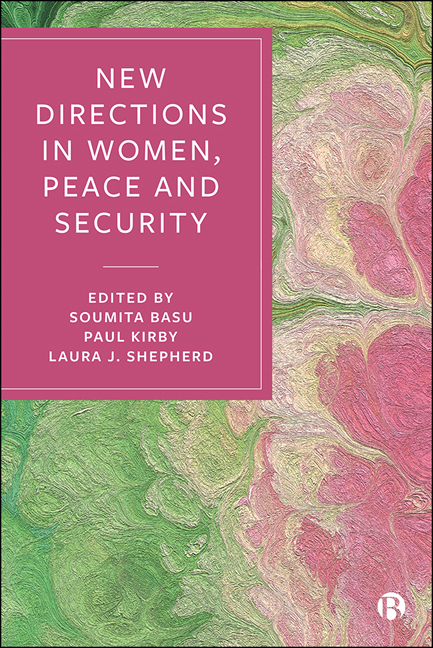4 - Difficult Encounters with the WPS Agenda in South Asia: Re-scripting Globalized Norms and Policy Frameworks for a Feminist Peace
Published online by Cambridge University Press: 12 March 2021
Summary
South Asia's ongoing conflicts and embattled ‘post-conflict’ transitions reveal the tensions inherent in the globalized Women, Peace and Security (WPS) agenda, between the ritualism of recognizing the relationship between gender inequality and violence, and the practice of incorporating women's plural perspectives to achieve genuine inclusion in conflict resolution and peace processes on the ground. A generation of macro-and micro-level studies of the diversity and complexity of the gendered experiences of the conflict– peace continuum in the region have shown that prescriptive norms and policy frameworks, derived from the neoliberal WPS template of peacemaking, run the risk of distorting and de-politicizing locally rooted women's peacework (Banerjee, 2008; Manchanda, 2017b). Some have argued that there is a narrowing of the original imagination of the global WPS agenda and missing in particular is the recognition of women's resistance politics and their resilience. The conceptual framing of WPS discourse undervalues the contextual understanding that the region's women's peace groups are integrally linked with broader struggles for socioeconomic justice and human security (Coomaraswamy and Fonseca, 2004; Hans, 2016).
Across the region, it is apparent that post-war transitions in conflict zones have produced a contentious politics of fragile agreements. In Nepal, for instance, consociational arrangements between contending elites serve as a substitute for a transformative politics of inclusion and equal rights (Falch and Miklian, 2008). There are protracted ceasefires and pacification in northeast India (Manchanda and Bose, 2015), internal domination in Sri Lanka, occupation in Jammu and Kashmir (Duschinski et al, 2018), a ‘violent peace’ in Chittagong Hill Tracts (CHT) (Bangladesh) (D’Costa, 2014), and relapse to war in Afghanistan. When confronted with unjust and exclusionary peace settlements that fail to tackle root causes, reconcile divided communities, roll back militarization, bridge development deficits and promote inclusion (MacGinty, 2011; Manchanda and Bose, 2015), women's collectives have innovated an everyday resistance politics. Feminist literature has also increasingly drawn attention to women's visibility in resistance struggles, their multifaceted roles in both non-violent and violent movements (Parashar, 2014; Allison, 2003; Yami, 2007).
In this chapter, I contend that the diversity in women's responses points to the range of women's lived understanding of the plural and contested meanings of militarization, insecurity, fundamental freedoms and, above all, peace.
- Type
- Chapter
- Information
- New Directions in Women, Peace and Security , pp. 61 - 82Publisher: Bristol University PressPrint publication year: 2020



